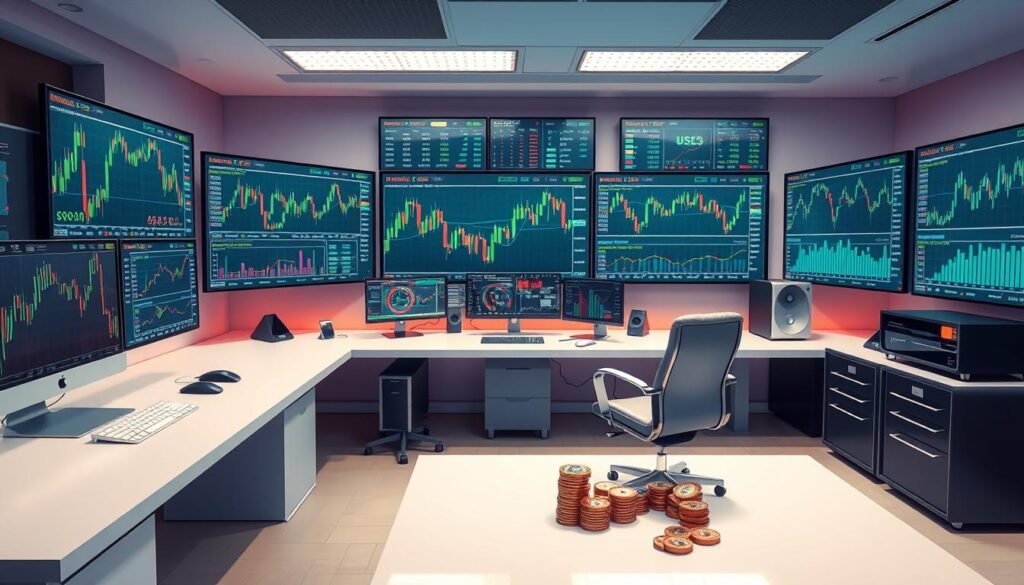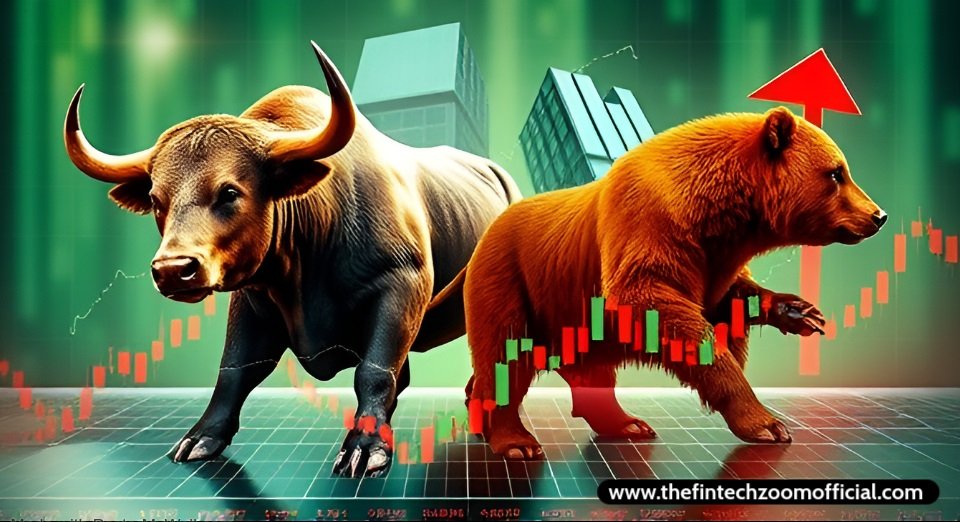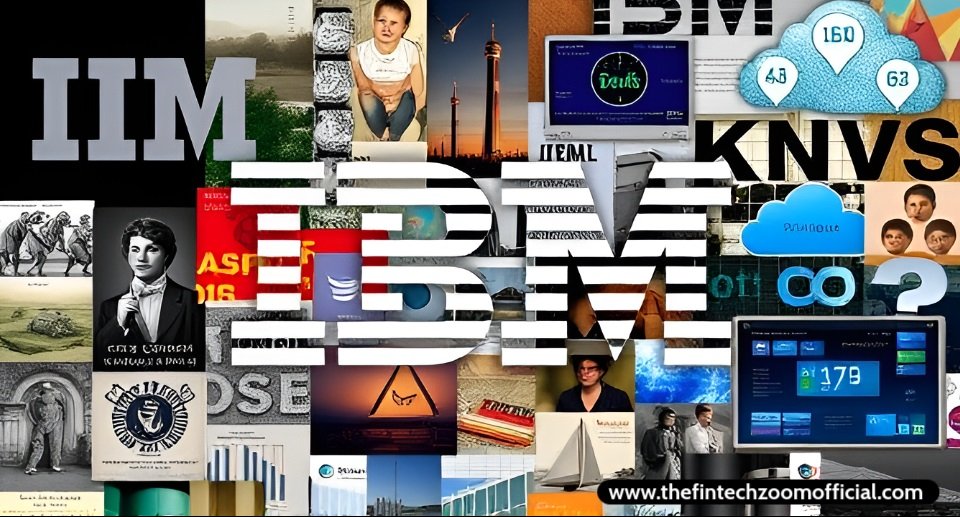Introduction
Did you know the forex market trades over $6.6 trillion daily? This huge number shows the big chances for traders. But, to succeed, you need the right knowledge and strategies. Fintechzoom can guide you through currency trading, helping you make more money.
This guide will share key tips and insights on the forex market. You’ll learn how to pick the best forex broker and create winning trading plans. With Fintechzoom’s help, you’re on your way to reaching your trading goals and understanding the forex market better.
Key Takeaways
- The forex market is the largest financial market globally, with daily transactions exceeding $6.6 trillion.
- Choosing the right forex broker is critical for maximizing your trading success.
- Fintechzoom provides valuable resources and evaluations to help you select the best brokers.
- Effective trading strategies are essential for navigating currency fluctuations.
- Understanding market dynamics and trends can significantly enhance your trading decisions.
Understanding the Forex Market
Getting to know the forex market is key for anyone looking to trade. Forex trading is about buying and selling currencies in a global market. This market is huge, with daily trades over $7.5 trillion.
The forex market is open 24/7, five days a week. This makes it easy for traders all over the world to join in.
What is Forex Trading?
Forex trading is about swapping one currency for another. This is called a currency pair. It’s important for many reasons, like converting money and managing risks.
Traders use different parts of the market to fit their strategies. This includes the spot, forward, and futures markets.
The Structure of the Forex Market
The forex market has several main parts. The interbank market is where big banks trade. Retail trading lets individual traders join in through brokers.
This setup offers many ways for traders to make money. They can use options and currency swaps to fit their risk level.
Participants in the Forex Market
Many different groups shape the forex market. Central banks set monetary policies and control currency values. Commercial banks help with transactions and keep the market flowing.
Hedge funds and individual traders also play big roles. They use economic data and world events to guide their trades. Knowing who’s in the market and what they do is vital for success.

The Role of Forex Brokers
Forex brokers are key players that link traders to the vast forex market. Knowing their role can improve your trading and help you make better choices.
What Does a Forex Broker Do?
A forex broker gives you access to trading platforms. Here, you can trade different currency pairs. They gather pricing data from many sources and offer tools to help you trade better.
These tools include live charts, market news, and analysis. Brokers can use different methods to execute trades. Some are Dealing Desk, while others are No Dealing Desk or Electronic Communication Network.
Key Features of a Good Forex Broker
Looking for a reliable broker? Here are important features to consider:
- Regulatory compliance: Make sure the broker is regulated by bodies like the CFTC or NFA.
- Low transaction costs: Look for brokers with competitive spreads and low fees.
- Reliable trading platforms: Choose platforms that are easy to use and stable.
- Access to educational resources: A good broker offers training to improve your skills.
- Variety of leverage options: Understand the leverage offered, which can impact your profits and risks.
In summary, picking a forex broker means looking at features that match your trading goals. A reputable broker makes trading smoother in a market that trades over $7.5 trillion daily.
In summary, picking a forex broker means looking at features that match your trading goals. A reputable broker makes trading smoother in a market that trades over $7.5 trillion daily.

Choosing the Best Forex Broker
Finding the right forex broker is key to a good trading experience. Important factors include regulatory compliance and understanding transaction costs. Making an informed choice can improve your trading and protect your investments.
Factors to Consider
When picking a forex broker, remember these points:
- Regulatory Status: Check if the broker follows forex regulation to keep your money safe.
- Broker Security: Choose brokers with strong security to protect your data and money.
- Transaction Costs: Know how spreads and commissions affect your trading costs.
- Trading Fees: Look for clear fee information and any extra costs for trading.
Regulation and Security Standards
In the U.S., forex brokers must register with the CFTC and follow NFA standards. This ensures they operate fairly and protect investors. Choosing a broker that meets these standards boosts security and lowers fraud risk.
Evaluating Transaction Costs
Transaction costs differ among brokers and can affect your profits. It’s important to understand these costs, like average spreads for currency pairs. For example, in April 2022, the EUR/USD spread ranged from 0.59 to 1.61 pips among top U.S. brokers.
Always ask about trading fees, withdrawal fees, and commission structures. This helps you understand the financial impact of your trading choices.
Fintechzoom: Finding Your Broker
Finding the right forex broker is key to your trading success. Fintechzoom helps by providing detailed broker evaluations. This makes choosing a broker easier in the complex forex world. They give you the important info to make smart choices.
How Fintechzoom Evaluates Brokers
Fintechzoom looks at several important factors when evaluating brokers. They check:
- Regulatory Status: Making sure brokers follow strict safety rules.
- Trading Conditions: Looking at spreads, commissions, and leverage options.
- Platform Usability: Testing how easy and feature-rich trading platforms are.
- Customer Feedback: Reading what real users say and rate.
This detailed method gives you a full view of each broker. It helps you compare them easily.
Top Recommended Brokers by Fintechzoom
Fintechzoom recommends these top forex brokers:
| Broker | Minimum Deposit | Average Spread | Tradable Assets | Currency Pairs |
| FP Markets | $0 | 0.1 pips | 10,000 | 55 |
| XM | $0 | 0.1 pips | 1,000 | 100 |
| Saxo Bank | $200 | 0.6 pips | 71,000 | 90 |
| IC Markets | $0 | 0.1 pips | 2,000 | 55 |
| Pepperstone | $200 | 1.1 pips | 1,200 | 74 |
These brokers are chosen for their good prices, wide range of assets, and great customer support. Fintechzoom also values their commitment to helping traders. This makes your trading journey better.
Forex Trading Platforms
Your choice of forex trading platform greatly affects how you interact with the market. Different platforms offer unique features that meet various trader needs. MetaTrader 4 and MetaTrader 5 are popular for their advanced tools and automated trading options. They are great for both new and seasoned traders.
Popular Platforms to Consider
When picking a forex trading platform, look at these well-liked options:
- MetaTrader 4 (MT4) – Known for its easy-to-use interface and many technical indicators.
- MetaTrader 5 (MT5) – An updated version of MT4 with more features for forex traders.
- TradingView – Has lots of indicators and tools, plus social trading features, with over 50 million users.
- cTrader – Offers top-notch charting and automated trading, perfect for fast trading.
- ZuluTrade – A social trading platform that lets you follow and copy successful traders.
Mobile Trading Capabilities
Mobile trading is key in today’s fast market. Good mobile trading lets you watch market moves and trade from anywhere. Top platforms have mobile apps with the same features as their desktop versions. This way, you can trade better and quickly respond to market changes.
Platforms like MetaTrader have made their mobile apps work well, so you can trade anywhere.
| Platform | Key Features | Best For |
| MetaTrader 4 | Automated trading, expert advisors, technical indicators | Beginners and intermediate traders |
| MetaTrader 5 | Multi-asset capability, more indicators, better order types | Advanced traders |
| TradingView | Social trading, user-friendly charts, multiple indicators | All levels |
| cTrader | High-frequency trading, integrated trading functionalities | Active day traders |
| ZuluTrade | Copy trading features, trader scoring | Social traders |
Forex Trading Strategies
Creating effective forex trading strategies is key to success in currency trading. Different strategies fit different trading styles and market conditions. You can pick methods that match your risk level, investment time frame, and analysis style.
Understanding Currency Trading Strategies
It’s important to find the right forex trading strategies for you. Popular strategies include:
- Scalping
- Day trading
- Swing trading
- Position trading
Each strategy needs a unique approach and understanding of market dynamics. Position trading, for example, involves holding a currency pair for weeks or months. It’s great for those who like a less active trading style.
Technical and Fundamental Analysis
To make better trading decisions, you need to know technical and fundamental analysis. Here’s a quick overview:
- Technical Analysis: This method looks at price trends and patterns in market data. Tools like support and resistance levels, the Relative Strength Index (RSI), and moving averages help predict market movements.
- Fundamental Analysis: This approach examines economic indicators and global events that affect currency changes. Things like interest rates, unemployment rates, and GDP figures play a big role in your trades.
Knowing these analyses helps you make informed decisions. Using technical indicators with fundamental factors can lead to better trading results.
Here’s a table that summarizes key aspects of popular forex trading strategies:
| Strategy | Time Horizon | Key Focus |
| Scalping | Seconds to minutes | Quick trades to capture small price changes |
| Day Trading | Minutes to hours | Closing trades by market close |
| Swing Trading | Days to weeks | Capturing price swings in the market |
| Position Trading | Weeks to months | Long-term market trends |
By mastering different trading methods, you can adapt to forex market changes. This keeps you ahead of trends while reducing risks. Using both technical and fundamental analysis in your strategies can greatly improve your trading success.

Forex Market Trends and Analysis
Watching forex market trends is key for smart trading. It helps spot chances in the market. Traders use tools and indicators to stay on top in this quick world.
Current Trends in the Forex Market
The forex market moves due to many things like economic signs, world events, and market mood. Knowing these trends is important for traders to improve their plans.
- Major Trends: These are long-term moves lasting months or years, great for long-term investors.
- Intermediate Trends: These trends last from days to weeks, good for medium-term traders.
- Minor Trends: Very short trends, less than a day, key for day traders and scalpers.
Indicators like the Average Directional Index (ADX) and the Relative Strength Index (RSI) are key. The ADX shows trend strength, and the RSI spots when the market is too high or too low.
Using Forex Signals Effectively
Forex signals can boost trading strategies if used right. These signals are based on data and tell traders about market changes. Using trend analysis can help make better choices.
| Indicator | Function | Interpretation |
| ADX | Trend strength | Above 25 shows strong trends. |
| RSI | Overbought/Oversold | Above 70 means it’s overbought, below 30 means it’s oversold. |
| MACD | Trend direction | Crossovers show possible trend changes. |
| Bollinger Bands | Market volatility | The upper band shows possible uptrends. |
| Volume | Trend strength assessment | Low volume in upticks may mean weak trends. |
Using tools like moving averages and trend lines helps traders spot trend changes. Knowing these helps in better market analysis and using forex signals well.
Risk Management in Forex Trading
Effective risk management is key in the forex market. It helps traders protect their investments during market ups and downs. By managing risk well, traders can aim for long-term gains, just like casinos do.
Importance of Risk Management
In forex trading, knowing the risks is vital for success. Good risk management turns trading into a strategic game, not a gamble. Like casinos, using strong risk management strategies helps control losses, leading to gains over time.
The forex market trades around $7.5 trillion daily. This huge volume makes controlling risks essential. It’s like a casino’s small edge over players.
Tools and Techniques for Managing Risk
Using trading risk tools can improve your trading. Here are some techniques to consider:
- Stop-loss orders: Set specific loss limits to protect your capital.
- Position sizing: Calculate the size of each trade relative to your total capital and risk tolerance, typically starting around 2% per trade.
- Trading journals: Keep records of your trades, documenting entry and exit reasons to reflect on your strategies.
- Leverage caution: Understand that high leverage magnifies risks; a 100:1 leverage can significantly affect your results.
- Market awareness: Be mindful of news events and the possible market volatility that could affect your trades.
- Weekend gaps: Avoid holding positions over weekends without a risk management plan in place to shield against adverse movements.
By focusing on careful risk assessment and using these tools, you’ll develop a disciplined approach. This will help you succeed in the forex market.
Conclusion
Success in the forex market depends on knowing trading strategies, choosing good brokers, and managing risks well. The forex market is huge, with over USD 7.5 trillion traded daily. But, it’s complex and needs a smart plan. Using Fintechzoom’s tips can really improve your trading skills.
When trading currencies, it’s key to understand different markets like spot, forward, and futures. Each has its own perks, helping you make better trading plans. Also, getting advice from forex brokers is important to support your trades in currencies like USD, EUR, and JPY.
Keep learning and stay up-to-date with new trends to succeed in the forex world. The market’s big liquidity and easy access offer many trading chances. With the right knowledge, you can make a lot of progress in your forex journey.
FAQ
What is the forex market?
The forex market is the biggest financial market globally. It’s where currencies are traded. It’s open 24/5 and handles over $6.6 trillion daily.
How do I choose the right forex broker?
Look for a broker with a good regulatory status and low transaction costs. Check their platforms, customer support, and what other traders say. This ensures a safe trading experience.
What trading platforms are commonly used in forex trading?
MetaTrader 4 and MetaTrader 5 are top choices. They have tools for charting and automated trading. They’re good for both new and experienced traders.
What are the key components of successful forex trading strategies?
Good strategies include managing risk well and understanding technical and fundamental analyses. Staying updated with market trends and signals is also key.
What role do forex signals play in trading?
Forex signals give traders data on market chances. They help make smart trade decisions based on analysis.
Why is risk management important in forex trading?
Risk management keeps your investment safe from market surprises. Using stop-loss orders and knowing about leverage can reduce losses.
How can I analyze currency pairs effectively?
Analyzing pairs involves technical and fundamental analysis. Technical analysis looks at price trends. Fundamental analysis considers economic and geopolitical factors.
What platforms offer mobile trading capabilities?
Top forex brokers have strong mobile trading features. This lets traders work on trades anywhere. It’s key for staying efficient in today’s fast market.
External Source
- How To Start Forex Trading: A Guide To Making Money with FX – https://www.investopedia.com/articles/forex/11/why-trade-forex.asp
- Foreign Exchange Market: How It Works, History, and Pros and Cons – https://www.investopedia.com/terms/forex/f/foreign-exchange-markets.asp
- Forex Broker: Definition, Role, Regulation, and Compensation – https://www.investopedia.com/terms/forex/c/currency-trading-forex-brokers.asp
- How Forex Brokers Make Money – https://www.investopedia.com/articles/forex/041515/how-forex-brokers-make-money.asp







Leave a Reply